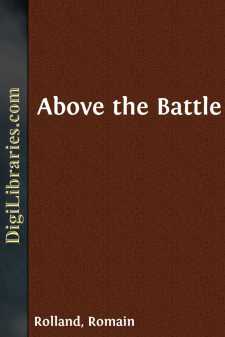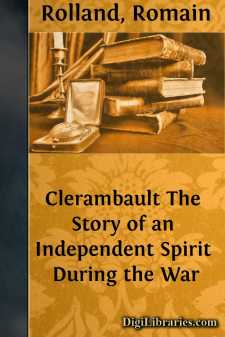Categories
- Antiques & Collectibles 13
- Architecture 36
- Art 48
- Bibles 22
- Biography & Autobiography 813
- Body, Mind & Spirit 142
- Business & Economics 28
- Children's Books 15
- Children's Fiction 12
- Computers 4
- Cooking 94
- Crafts & Hobbies 4
- Drama 346
- Education 46
- Family & Relationships 57
- Fiction 11828
- Games 19
- Gardening 17
- Health & Fitness 34
- History 1377
- House & Home 1
- Humor 147
- Juvenile Fiction 1873
- Juvenile Nonfiction 202
- Language Arts & Disciplines 88
- Law 16
- Literary Collections 686
- Literary Criticism 179
- Mathematics 13
- Medical 41
- Music 40
- Nature 179
- Non-Classifiable 1768
- Performing Arts 7
- Periodicals 1453
- Philosophy 64
- Photography 2
- Poetry 896
- Political Science 203
- Psychology 42
- Reference 154
- Religion 513
- Science 126
- Self-Help 84
- Social Science 81
- Sports & Recreation 34
- Study Aids 3
- Technology & Engineering 59
- Transportation 23
- Travel 463
- True Crime 29
Romain Rolland
Romain Rolland (1866–1944) was a French writer, playwright, and musicologist, best known for his commitment to social justice and pacifism. He won the Nobel Prize in Literature in 1915 for his 10-volume novel series "Jean-Christophe," which follows the life of a German musician. Rolland was a strong advocate for non-violence and humanism, and he corresponded with notable figures like Mahatma Gandhi. His other works include "The Life of Beethoven" and "The People's Theatre," which reflect his passion for art as a means of social change.
Author's Books:
Sort by:
by:
Romain Rolland
INTRODUCTION"Over the carnage rose prophetic a voice,Be not dishearten'd, affection shall solve the problem of freedom yet.. . . . . . . . .(Were you looking to be held together by lawyers?Or by an agreement on a paper? or by arms?Nay, nor the world, nor any living thing, will so cohere.)"These lines of Walt Whitman will be recalled by many who read the following pages: for not only does...
more...
by:
Romain Rolland
PART ONE Agénor Clerambault sat under an arbour in his garden at St. Prix, reading to his wife and children an ode that he had just written, dedicated to Peace, ruler of men and things, "Ara Pacis Augustae." In it he wished to celebrate the near approach of universal brotherhood. It was a July evening; a last rosy light lay on the tree-tops, and through the luminous haze, like a veil over the...
more...



